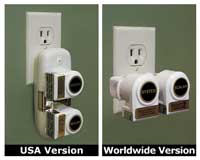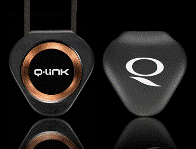|
Cellphone Usage Limits Urged
By Health Canada

Cell Tower
Life Bluetube Headsets
Cell Phone Towers Health Effects
EM Field Meter
Cell Phone Sensitivity
The Canadian Press | October 05, 2011
Parents should encourage kids under 18 to limit the time
they spend talking on cellphones, Health Canada said Tuesday
in new advice on mobile phone usage.
The guidance is a nuanced change from previous advice, which
suggested that people could limit their use of cellphones if
they were concerned about an unproven suggestion the devices
increase one's risk of developing brain cancer.
"Really it's more proactive in encouraging cellphone users
to find ways to limit their exposure, and ... to empower
parents to make healthy choices to reduce their children's
exposure," explained James McNamee, division chief for
health effects and assessments in Health Canada's bureau of
consumer and clinical radiation protection.
The new advice, a response to a World Health Organization
report issued in May, reminds people they can reduce their
exposure to radiofrequency energy by limiting the length of
their cellphone calls and substituting text messages or
chats on hands-free devices in the place of phone-to-ear
cellphone calls.
Radiofrequency energy is the type of radiation emitted by
cellphones. It's also given off by AM-FM radios and TV
broadcast signals.
Canadians own and use an estimated 24 million cellphones.
Worldwide it is estimated that five billion people owned
cellphones in 2010.
There have long been questions as to whether the devices
increase a user's risk of developing brain cancer. Despite
the fact that dozens of studies have looked at the question,
there is no clear answer.
But a statement issued in late May by the International
Agency for Research on Cancer — the cancer arm of the WHO
—classified cellphones as a category 2B risk, meaning the
agency acknowledged mobile phones are possibly carcinogenic
to people. McNamee sat on the panel that took the decision.
Health Canada says more research needed
Health Canada says the data suggesting the link is far from
conclusive and more research is needed.
But in light of the shift, the department decided it should
tweak its advice on cellphone use, especially as it relates
to kids.
"We want to make people aware that there is some uncertainty
in the science, particularly for children. Because there
have been no long-term studies, or very, very few long-term
studies with children," McNamee said.
"They are often more sensitive to a variety of agents than
adults. They're not little people, in essence. Their brains
are still developing, their immune systems are still
developing. So you can't say the risk would be equal for a
small adult as for a child, per se."
Little change from status quo, industry says
Still, the department isn't advocating set limits or
changing the safety regulations for cellphones. In fact, an
industry spokesperson interpreted the statement as little
change from the status quo.
"It would be a slight shift in messaging, I suppose, but I
believe that the updated information from Health Canada is
simply a reminder to Canadians about the state of science on
this topic, and any steps that individuals, and their
children, can take," Marc Choma, director of communications
for the Canadian Wireless Telecommunications Association,
said by email.
"I think Health Canada is reiterating that, to date, the
science has not shown a link between cellphone use and
health concerns, but that more research is recommended. The
industry has always supported any calls for continued
research that is deemed necessary by the international
scientific community."
Health Canada did not appear to want to hit the message too
hard.
McNamee objected to the suggestion the department was
"urging" parents to restrict cellphone use by their kids.
The tone the department is trying to set is more accurately
reflected by the word "encouraging," he suggested.
"It's not urging. Cellphones can certainly be beneficial for
parents and for children. And they're a convenience."
"Not much has changed," McNamee added. "The advice to
Canadians is largely the same. The science hasn't really
changed. Health Canada's just being a little more proactive
on this, in a nutshell."
Slovenia, Lujblijana
Portugal, Lisbon
Hungary, Budapest
Liechtenstein, Vaduz
Anaheim, California
United States, Washington, D.C.
Niger, Niamey,
Sydney, Australia
Spain, Madrid
Al Hayrah, United Arab Emirates, Al Hayrah, UAE
http://www.emfnews.org/store |








